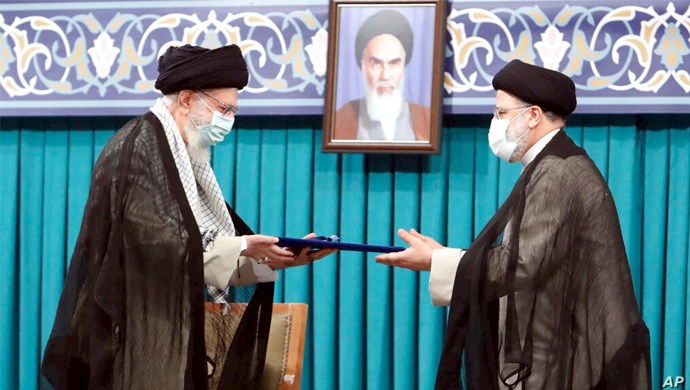Analysis by PMOI/MEK
Iran, August 4, 2021—On Tuesday, Iranian regime supreme leader Ali Khamenei announced his official endorsement of Ebrahim Raisi, the regime’s new president. Raisi was appointed as the regime’s president following the sham presidential election held on June 18, which was boycotted by some 90 percent of the Iranian population.
In his endorsement decree, Khamenei described Raisi as “wise, indefatigable, experienced and popular.” Unsurprisingly, none of those characteristics apply to Raisi, who headed the regime’s judiciary branch before presidency.
During the runup to the elections, Raisi’s rivals criticized him for his near-zero experience in government affairs, especially foreign policy and economics, and his lack of education. Raisi has been studying in seminaries since sixth grade and has no formal scientific education, according to the regime’s own officials. As for being popular, in Iran, Raisi’s name has virtually become synonymous with “execution” and “torture.” He is best known for his pivotal role in the 1988 massacre, in which he was a member of the “death commission,” a group of regime officials who signed the death warrant of 30,000 innocent political prisoners. The murder and torture of protesters in November 2019 also took place under Raisi’s watch.
Raisi has been placed under U.S. sanctions for his blatant human rights abuses and his presidency has caused worry among human rights organizations and activists. Even former regime president Hassan Rouhani had previously described Raisi as a person who “knows nothing other than execution and prison.”
The one thing that might be attributed to Raisi is “indefatigable,” and that is in his efforts to serve Khamenei, to suppress protests and dissidents, and to keep the brutal regime of the mullahs afloat.
In the endorsement ceremony, Raisi described the widely boycotted June 18 election as a “glorious spectacle.” He repeatedly used the word “change” to describe the beginning of his government’s work and promised to rebuild public trust, bridge the gap between the people and the government, and to fight corruption.
Interestingly, Raisi himself is a symbol of corruption. He was formerly the caretaker of the Astan-e Qods Foundation, a so-called charity foundation that has gobbled up a large part of Iran’s economy and is channeling billions of dollars out of the people’s pockets into the regime’s nefarious activities. Also, many of his peers and subordinates in the judiciary are under investigation for embezzlement charges.
Raisi also didn’t provide any concrete roadmap as to how he plans to fulfill his promises. Instead, he implicitly tried to lay the blame for the broken state of the economy on Rouhani and acknowledged that the country suffers from 44 percent inflation, 680-percent growth of liquidity, and a 4,500-trillion-rial government budget deficit.
And Khamenei warned that “solving economic problems takes a long time. Our dear people know this and should also know that problems can’t be solved in one night. It needs time.”
Otherwise put, both Khamenei and Raisi implied that the people of Iran shouldn’t expect anything but “more of the same” under the new government. And the people of Iran already know this. On the morrow of the elections, people of different communities came to the streets to voice their demands, because they know that no matter who sits on the seat of presidency, the only way they can get their rights is to fight for it. From oil workers to ranchers and farmers and government workers, Iranians have resumed their protests movements. And in the past two weeks, protests over water and electricity shortages have turned into anti-regime demonstrations, calling for the overthrow of the regime and the ouster of Khamenei, the unelected and ultimate leader of the regime. As the people of Iran have been chanting in the past few days, “As long as the mullahs are in power, Iran won’t be a country.”
All the clerical regime’s leaders, esp. Khamenei, Raisi, and Ejeii, must be brought to justice for committing genocide and crimes against humanity, and for four decades of murder, plunder, and the destruction of the nation's assets and resources. #Iran
— Maryam Rajavi (@Maryam_Rajavi) August 3, 2021
In a statement, Mrs. Maryam Rajavi, the president-elect of the National Council of Resistance of Iran (NCRI), said, “Ebrahim Raisi’s presidency put an end to any illusions about moderation or reform in this regime forever. The overwhelming boycott of the sham election last June is the flipside of the uprisings from 2017 until today, speaking to the Iranian people’s desire to overthrow the regime. This is something that Khamenei is vigorously trying to forestall by taking advantage of the Coronavirus pandemic and massive human casualties.
“In the eyes of the Iranian people… all the regime leaders, especially Khamenei, Raisi, and the Judiciary Chief Gholam Hossein Mohseni Eje’i, must be brought to justice for committing genocide and crimes against humanity, and for four decades of murder, plunder, and destruction of the nation’s assets and resources.”





